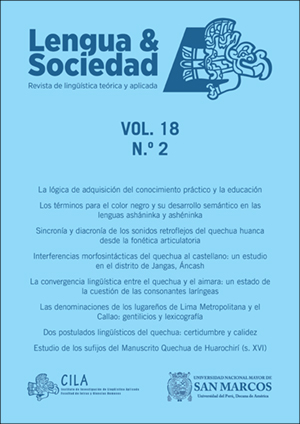The logic of acquiring practical knowledge and education
DOI:
https://doi.org/10.15381/lengsoc.v18i2.22320Keywords:
Practical knowledge, hypothetical knowledge, practical logic of language acquisition, units of meaning, social practices, tacit knowledge, indigenous pedagogical culturesAbstract
In this article we try to reflect on the recently discovered logic of practical knowledge and its consequences for education and educational policies. This logic manifests itself in the process of socialization, which concatenates units of meaning that are social practices with implied and never formulated rules that require skills that the child acquires building its own universe of meaning. This is the frame of reference of the Young child: common sence and not his knowledge of the world, because his only source of knowledge is his language and his community. It is this process which evidences the real logic of language, because the way language is acquiered that is how it is. And only recognizing the dominant place that the logic of the practical knowledge has, is that we can lay the groundwork for a pertinent and intercultural education that can avoid the problems of cultural rejection that always face the educational projects that are not based on the educational cultures of peoples.
References
Aristóteles. (1978). Metafísica. Traducción directa del griego, Introducción, Exposiciones Sistemáticas e Índices de Hernán Zucchi. Buenos Aires: Sudamericana.
Feyerabend, P. K. (1986 [1975]) Tratado contra el método. Esquema de una teoría anarquista del conocimiento. Londres: Tecnos.
Helberg, H. (1996). Mbaisik… en la penumbra del atardecer. Literatura oral del pueblo harakmbut. Lima: CAAAP.
Helberg, H. (2001). Pedagogía de la interculturalidad. Lima: Programa FORTE-PE.
Helberg, H. (2001). Fundamentación intercultural del conocimiento. Lima: Programa FORTE-PE.
Helberg, H. (2007). Dimensiones de la Realidad. Lima: Facultad de Educación UNMSM.
Helberg, H. (2018). La libertad creativa como principio social. Amazonía, 5(13).
Helberg, H. (2018) Reflexiones para mejorar la educación intercultural bilingüe. Amazonía, 5(12).
Helberg, H. (2017). La nueva lingüística del habla. Lengua y Sociedad, 16(1), 5-20.
Helberg, H. (2017). Las carreras interculturales en el centro de la discusión política y académica.
Helberg, H. (2017). Conocimiento intercultural: indicaciones metodológicas. Lima: Sur - Escuela Superior de Gestión.
Helberg, H. (2015). La gestión del conocimiento, los pueblos indígenas y el poder. Desde el Sur, 6(2), 11–23.
Helberg, H. (2014). Interkulturelle Epistemologie [Epistemología Intercultural]. Concordia, Revista Internacional de Filosofía Universidad de Aachen, 64.
Helberg, H. (2012). Aufgeklärte Praxis: Philosophie für das 21 Siecle. Jahrhundert [La praxis lúcida: Filosofía para el Siglo XXI]. Concordia, Revista Internacional de Filosofía Universidad de Aachen, 62.
Helberg, H. (2008). Epistemología de la interculturalidad latinoamericana. El Vuelo de la luciérnaga, 1.
Kuhn, T. (2005). La estructura de las revoluciones científicas. España: Fondo de Cultura Económica de España.
Lao Zi. (1994). El libro del tao (Traducción, prólogo y notas de Juan Ignacio Preciado). México: Alfaguara.
Reichel Dolmatoff, G. (1971). Amazonian Cosmos. The Sexual and religious Symbolism of the Tukano Indians. Chicago y London: The University of Chicago.
Reichel Dolmatoff, G. (1968). Desana. Simbolismo de los Indios Tukano del Vaupés. Bogotá: Universidad de los Andes - Revista Colombiana.
Reichel Dolmatoff, G. (1975). The Jaguar and the Shaman: A Study of Narcotic Drugs among the Indians of Colombia. Philadelphia: Temple University.
Reichel Dolmatoff, G. (1981). Brain and Mind in Desana Shamanism. Journal of Latin American Lore, 7(1), 73-98.
Reid, T. (1997 [1764]). Inquiry into the Human Mind on the Principles of Common Sense [Investigación en la mente humana en los principios del sentido común]. Edimburgo: The Edinburgh University.
Reid, T. (2011 [1785]). Essays on the Intellectual Powers of Man [Ensayos sobre las energías intelectuales del hombre]. Inglaterra. Reino Unido: Cambridge University.
Wittgenstein, L. (2001 [1953]). Philosophische Untersuchungen. Kritischgenetische Edition. Herausgegeben von Joachim Schulte in Zusammenarbeit mit Heikki Nyman, Eike von Savigny und Georg Henrik von Wright. Frankfurt am Main: Suhrkamp Verlag.
Wittgenstein, L. (1970). Über Gewiβheit. Frankfurt a.M.: Suhrkamp Verlag,
Chuang-tzu. (s. f.). Zhuangzi: Selected Chapters. Lin Yutang’s translation of the Chuangtzu. The World Wide Web Library.
Downloads
Published
Issue
Section
License
Copyright (c) 2019 Heinrich Helberg Chávez

This work is licensed under a Creative Commons Attribution 4.0 International License.
AUTHORS RETAIN THEIR RIGHTS
a. Authors retain their trade mark rights and patent, and also on any process or procedure described in the article.
b. Authors can submit to the journal Lengua y Sociedad, papers disseminated as pre-print in repositories. This should be made known in the cover letter.
c. Authors retain their right to share, copy, distribute, perform and publicly communicate their article (eg, to place their article in an institutional repository or publish it in a book), with an acknowledgment of its initial publication in the journal Lengua y Sociedad.
d. Authors retain theirs right to make a subsequent publication of their work, to use the article or any part thereof (eg a compilation of his papers, lecture notes, thesis, or a book), always indicating its initial publication in the journal Lengua y Sociedad (the originator of the work, journal, volume, number and date).



























